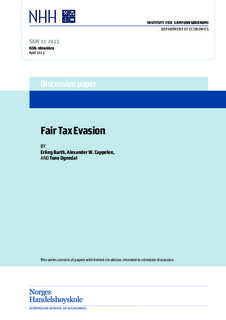| dc.contributor.author | Barth, Erling | |
| dc.contributor.author | Cappelen, Alexander W. | |
| dc.contributor.author | Ognedal, Tone | |
| dc.date.accessioned | 2013-07-30T10:35:18Z | |
| dc.date.available | 2013-07-30T10:35:18Z | |
| dc.date.issued | 2013-04 | |
| dc.identifier.issn | 0804-6824 | |
| dc.identifier.uri | http://hdl.handle.net/11250/163398 | |
| dc.description.abstract | In this paper we analyse how fairness considerations, in particular considerations of just
income distribution, affect whether or not people find tax evasion justifiable and their
willingness to evade taxes. Using data from the Norwegian “Hidden Labour Market Survey”
we show that individuals with low hourly wages and long working hours have a higher
probability of justifying tax evasion. These are individuals that arguably are treated unfairly in
a tax system that taxes an individual’s total income without taking into account how many
hours the individual has worked. The same individuals are also more willing and likely to take
home income without reporting it to the tax authorities. The results are consistent with a
model in which individuals make a trade-off between economic gains and fairness
considerations when they make decisions about tax evasion. Taken together our results
suggest that considerations of fair income distribution are important for the analysis of tax
evasion. | no_NO |
| dc.language.iso | eng | no_NO |
| dc.publisher | Norwegian School of Economics. Department of Economics | no_NO |
| dc.relation.ispartofseries | Discussion paper;11/2013 | |
| dc.subject | tax evasion | no_NO |
| dc.subject | redistributive taxation | no_NO |
| dc.subject | fair income distribution | no_NO |
| dc.title | Fair tax evasion | no_NO |
| dc.type | Working paper | no_NO |
| dc.subject.nsi | VDP::Social science: 200::Economics: 210::Economics: 212 | no_NO |
| dc.subject.jel | D63 | |
| dc.subject.jel | H26 | |
